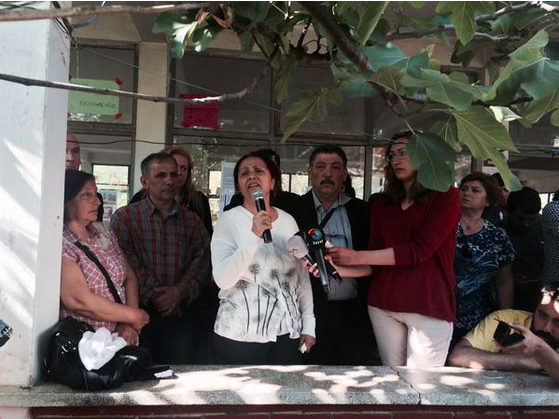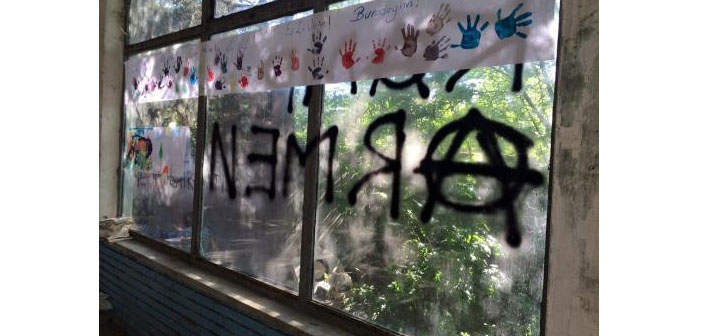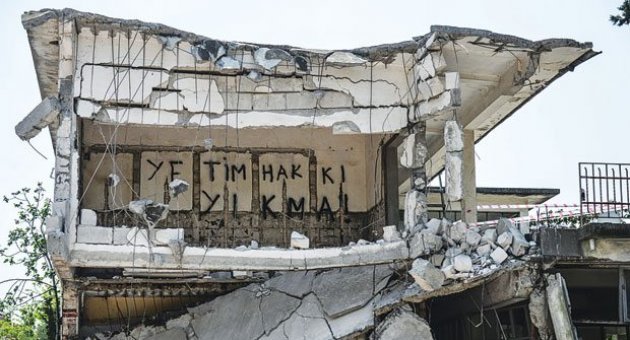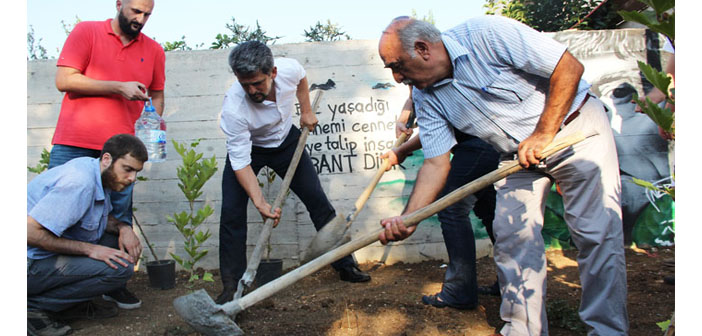A gathering was organized at Kamp Armen, which still faces the threat of demolition, after activists and the public thwarted the initial attempt. Speaking at the gathering, Rakel Dink said, “This story must not end here”.
On the fourth day of the vigil to protect the camp, a gathering was held to protest against the demolition and display solidarity. Many people begun to arrive at the camp from the morning on. Former students of Kamp Armen, the family of Sevag Balıkçı, who was murdered while fulfilling his compulsory military duty, the family of Maritsa Küçük, who passed away following an attack targeting her in Samatya, HDP parliamentary candidates and administrators were at the camp.
An Armenian language lesson was taught for the first time after many years at the camp. Sevag Balıkçı’s mother Ani Balıkçı taught an Armenian lesson to the camp members. Students from schools in the vicinity of the camp staged a theatre play. Folk dances were danced throughout the day.
Rakel Dink then spoke to those who gathered at the camp:
“To be here, in this place where such deplorable events have taken place gives us hope and strength. The reason each and every one of us is here to say, ‘I am for this cause as well’. You, of course, do not expect thanks from us for doing this, but we still want to thank you. God says, “The devil comes to steal, kill and destroy.” So you understand it all from these three words. Every inch of this camp was made with the labour of us children, and every inch of it contains our memories. We want these memories to be respected. We want them to realize how this labour was crated out of nothing. How sad it is that those on the losing side once again have to provide evidence for their deeds. This is also an emergency situation. We once again give thanks to God that we are here.”
Dink then went onto recount the history of the camp:
“This place was first imagined in 1962, for the children, the remnants of the sword from Anatolia, whose school was in the basement of the Gedikpaşa Armenian Protestant Church, as a place where they could get some fresh air in the summer. Away from the noise and fuel smell of the city, a place to have a meaningful holiday, a place that could assist in the physical and spiritual development of children, that was how this place was first imagined. An empty plot of land was found. The church then paid to purchase this land. By obtaining all the necessary permissions from the State, a deed was registered, construction begun, electricity was connected, water was connected. All this was done with the permission of the State. At no stage of all these procedures did the State tell us, “You do not have the right to acquire property”.
Then they got together and thought, ‘what can we do to take their possessions off them. They remembered the 1936 Declaration. Then they told us, ‘this property of yours is not registered in this declaration’. Yes, it wasn’t, because it didn’t exist back then. Until 1986, this place was used as a children’s camp. Under the organization and assistance of a master builder, children built this camp. I also worked in the construction of the road. We brought stones, and delivered sand with wheelbarrows. We strove hard to keep this place standing. But they found a suitable trick and said, ‘This place is not yours’. So I say, since you took it off us, at least use it for some purpose. They took it off us, and what did they do with it, they gifted it back to its former owner, from whom it had been purchased from in return of money in the first place. And so what did he do, he sold it on, and the next owner heard the camp’s story, and he sold it on as well. Whose doing was it? The State’s. How can this disgrace be remedied? In the same manner in which the State said ‘this place can’t belong to you’, it must now say, ‘it is yours, it belongs to you’. If it has the virtue of apologizing, that is. If it doesn’t, it’s up to them; we don’t need any apology anyway. This story must not end here; the story of this place must not end in this way. That is why we are here, that is why we stand hand-in-hand.”
Following Dink’s speech, Garabet Orunöz, another former student of Kamp Armen, made a call for the return of the camp.
Nor Zartonk activist and HDP parliamentary candidate Murad Mıhçı also stated that they would put up a struggle against demolition
The gathering at the camp continued with a concert by Vamank.





